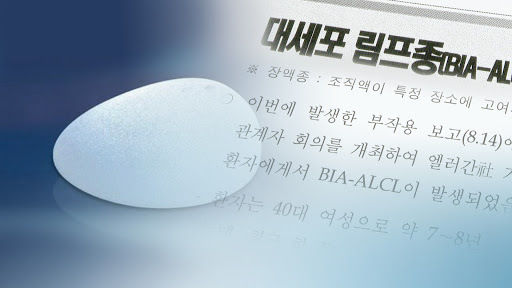 |
(Yonhap) |
Some 6,544 cases of side effects from silicone gel breast implants have been reported over the past four years in South Korea, according to government data released by a ruling party lawmaker on Tuesday.
That was the highest number of side effects reported among the 34 major medical implants from 2017 through September this year, Rep. Nam In-soon of the Democratic Party said, citing data she received from the Ministry of Food and Drug Safety.
In terms of the number of side effects, breast implants were followed by artificial hip joints (1,850 cases), artificial knee joints (957 cases), special-material knee joints (482 cases), artificial shoulder joints (167 cases), implantable cardioverter defibrillators (131 cases), electrodes for implantable cardioverter defibrillators (95 cases) and breast tissue expanders (79 cases).
Various side effects were reported, from swelling to ruptures of the breast implants and loosening of the implanted joints, which led to reoperation.
Rep. Nam called for tightened safety controls as reports of side effects are rising with the increase in production and usage of medical implants.
Some 1,319 different medical implants have been approved for use last year, up 286 percent from 342 in 2015.
Production of medical implants also more than doubled over the past four years to 139.33 million units in 2019.
By value, some 1.65 trillion won of medical implants were produced last year, up from 1.08 trillion won in 2016.
“We need to step up research on patient registration for medical devices (including implants) of which many cases of side effects have been reported,” Rep. Nam said.
“We should find out what caused them in order to come up with measures on how to compensate for damage due to side effects.”
US pharmaceutical company Allergan announced last year a global recall of its biocell textured breast implants after a rare type of cancer called anaplastic large-cell lymphoma was linked to textured breast implants.
Out of some 60,000 to 70,000 patients who got the product implanted in Korea, at least 13,000 cannot be tracked due to a lack of information, according to another set of data released by Rep. Nam.
Some 130,000 units of the recalled product have been sold to 1,242 medical institutions in the country, and the Ministry of Food and Drug Safety has gathered the personal information of 46,691 patients who got the implants.
Information of patients treated at 219 medical institutions was unavailable due to a lack of contact information or loss of medical records.
By Kim So-hyun (
sophie@heraldcorp.com)








![[Today’s K-pop] Blackpink’s Jennie, Lisa invited to Coachella as solo acts](http://res.heraldm.com/phpwas/restmb_idxmake.php?idx=644&simg=/content/image/2024/11/21/20241121050099_0.jpg)